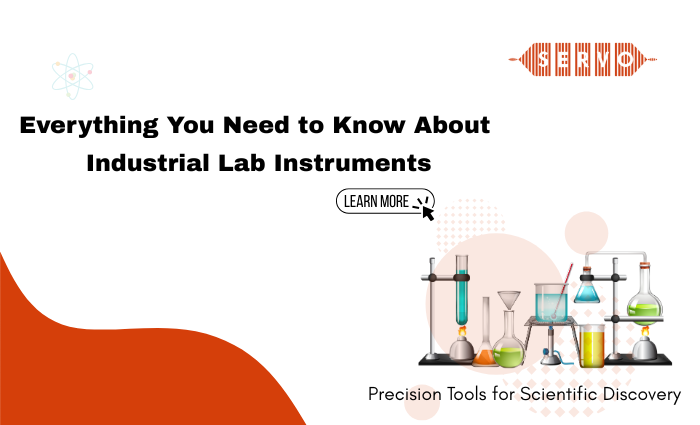Introduction
Industrial lab instruments are the backbone of quality control, research, and development in numerous industries worldwide. From pharmaceuticals to manufacturing, these instruments ensure precision, safety, and efficiency in testing and analysis. Whether you’re a lab technician, engineer, or business owner, understanding the essentials of industrial lab instruments can help you choose the right tools for your needs and maintain industry standards.
In this blog, we will cover the most important aspects of industrial lab instruments, including their types, applications, maintenance, and how they support multiple industries.
What Are Industrial Lab Instruments?
Industrial lab instruments are specialized tools and devices used in laboratories for testing, measurement, analysis, and quality control. These instruments help scientists and engineers gather accurate data to ensure that products meet required specifications and regulatory standards. Unlike consumer-grade equipment, industrial lab instruments are built for durability, high precision, and continuous operation.
Key Characteristics:
- High accuracy and sensitivity
- Robust build for industrial environments
- Calibration and certification for compliance
- Wide range of applications across industries
Types of Industrial Lab Instruments and Their Uses
There is a broad range of industrial lab instruments, each designed to serve specific functions. Some of the most commonly used categories include:
1. Analytical Instruments
- Spectrophotometers: Measure light absorbance to determine chemical concentrations.
- Chromatographs: Separate chemical mixtures for qualitative and quantitative analysis.
- pH Meters: Measure the acidity or alkalinity of samples.
2. Physical Testing Instruments
- Universal Testing Machines: Test material strength and flexibility.
- Hardness Testers: Measure the hardness of metals and materials.
- Viscometers: Measure fluid viscosity.
3. Environmental Testing Instruments
- Gas Analyzers: Monitor gas composition and pollutants.
- Moisture Analyzers: Measure moisture content in raw materials and products.
4. Process Control Instruments
- Pressure Gauges and Sensors: Monitor pressure in pipelines and reactors.
- Temperature Controllers: Maintain precise temperature control in processes.
5. Sterilization Equipment
Critical for maintaining contamination-free environments, sterilizers and autoclaves use steam, heat, or chemicals to sterilize lab instruments, glassware, and medical devices.
6. Cooling Instruments
Refrigerators, chillers, and cooling baths preserve temperature-sensitive samples and reagents, essential for pharmaceutical labs and biochemical research.
How Industrial Lab Instruments Support Multiple Industries
1. Pharmaceutical Industry
Precise instruments are used for drug formulation, stability testing, and quality control to ensure safety and compliance with regulatory agencies like the FDA.
2. Food and Beverage Industry
Instruments monitor product consistency, detect contaminants, and ensure packaging integrity to meet food safety standards.
3. Chemical Industry
Instruments analyze raw materials and end products to optimize formulations and ensure compliance with environmental standards.
4. Automotive and Aerospace
Testing machines ensure materials and components meet mechanical and safety requirements.
5. Manufacturing and Engineering
Process control instruments improve production efficiency and product consistency
Essential Tips for Choosing the Right Industrial Lab Instruments
Choosing the right instruments depends on your industry, testing needs, and budget. Here are some tips to guide you:
- Identify Your Testing Requirements
Understand what parameters you need to measure and the accuracy required. - Check for Industry Standards and Certifications
Choose instruments that comply with international standards such as ISO or ASTM. - Consider Durability and Maintenance
Select robust instruments suitable for your lab environment with accessible service support. - Evaluate User-Friendliness and Software Compatibility
Modern instruments often come with advanced software for data logging and analysis - Budget Wisely
Balance between upfront costs and long-term maintenance expenses.
Benefits of Using Industrial Lab Instruments
Industrial lab instruments offer several advantages that make them indispensable in various sectors. Here are the key benefits:
1. High Accuracy and Precision
Industrial lab instruments deliver reliable and precise measurements, essential for maintaining product quality and meeting regulatory standards.
2. Enhanced Efficiency and Productivity
Automated and advanced instruments streamline testing processes, reduce manual errors, and speed up analysis, leading to higher throughput.
3. Compliance with Industry Standards
Using calibrated and certified instruments ensures compliance with ISO, ASTM, FDA, and other global standards, avoiding costly recalls and legal issues.
4. Versatility Across Multiple Industries
These instruments can handle diverse sample types and testing conditions, making them adaptable for pharmaceuticals, chemicals, food, manufacturing, and more.
5. Improved Safety and Risk Management
Accurate lab instruments help detect contaminants, material defects, or hazardous substances early, reducing risks in production and end-use.
Maintaining and Calibrating Industrial Lab Instruments
Proper maintenance and regular calibration are critical to ensuring your lab instruments provide accurate and reliable data.
- Routine Cleaning: Prevent contamination and damage.
- Scheduled Calibration: Maintain precision by calibrating according to manufacturer guidelines or industry requirements.
- Documentation: Keep detailed maintenance and calibration records for audits and quality control.
- Professional Servicing: Engage certified technicians for repairs and major calibrations.
Conclusion
Industrial lab instruments play a vital role in driving quality, safety, and innovation across a wide range of industries. Understanding the types, applications, and maintenance of these instruments empowers professionals to make informed decisions and maintain high standards. Whether you are upgrading your lab equipment or setting up a new testing facility, prioritizing precision and reliability is key.
If you’re looking for a trusted lab instrument manufacturer that offers high-quality, reliable industrial lab instruments tailored to your industry’s needs, contact Servo Enterprises today to explore our extensive range of products and expert support services. Together, we can help you achieve excellence in testing and quality assurance.


